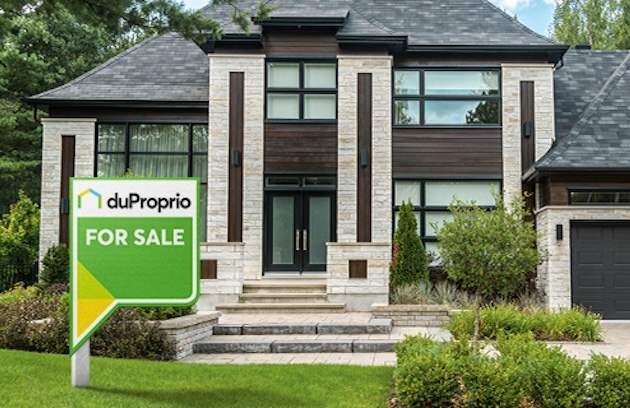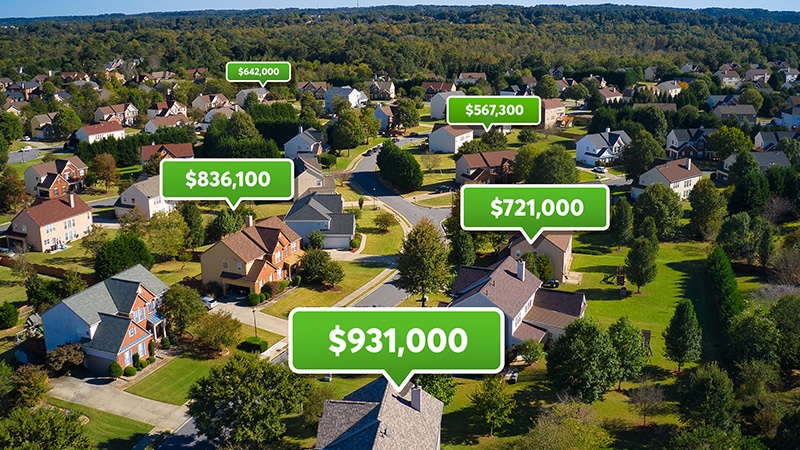

What’s your home worth? Looking beyond the municipal assessment
Last updated on February 4, 2026
Thinking about selling your property or refinancing with a financial institution? Before you get started, it’s important to do an in-depth assessment to figure out what your home is worth on the market. Relying only on the last municipal assessment—or a gut feeling—could be a mistake. Find out why you need a reliable estimate and how to get one.
Summary:
- Real estate value: It's all relative
- A property’s market value
- Municipal assessment
- A home’s selling price
- Why you should have your property appraised
- The art of appraising a home: Key things to keep in mind
- Making your real estate transaction a success
Real estate value: It’s all relative

Figuring out a home’s value before listing it isn’t always as simple as it seems. Even if the property feels priceless to you, there’s no guarantee buyers will pay the asking price without negotiating.
Property value depends mostly on demand at a given time. If a lot of people are looking for a certain type of property, its value goes up. But if a property type is easy to find or less in demand, its value goes down. The same goes for a home in a less sought-after neighbourhood. It’s basic supply and demand. Buying power is also a factor; potential buyers might move on if your listing is out of their price range.
An effective listing depends on setting the right price at the right time, based on market conditions and the property’s quality and location. That’s what we call market value, and it’s calculated very differently from a municipal assessment.
A property’s market value

Market value is used to set the price you could sell your home for, at the date of the appraisal. This estimate is specific to your property and might well differ from neighbouring homes. It changes over time and depends on supply and demand. Unfortunately, a real estate appraisal done a year ago is often outdated.
All of the property’s features go into calculating market value—interior, exterior, land, neighbourhood, area—and, of course, market conditions. Drawbacks will be considered too, like a nearby train line, slaughterhouse or paper mill, or if it’s in a flood-prone area.
Note that market value isn’t the same as the rebuild cost used to set the insurance amount in case of a loss.
Municipal assessment
A municipal assessment is done by a municipal or private chartered appraiser. A property assessment roll is an inventory of all properties within a municipality’s boundaries. It lists the value of each property, as set by the city’s assessment department. Under the Act respecting municipal taxation, a new property assessment roll must be filed every three years.
Important: The municipal assessment value is not usually the one used to set a selling or purchase price.
It’s mainly used to determine how much owners pay in municipal and school taxes, so the cost is shared fairly and helps fund municipal and school services. The higher the value, the higher the property taxes. It’s useful for planning expenses, but it’s not a reliable way to determine a property’s value.
“Going solely with the municipal assessment can be misleading,” explains Marlène Bates, a professional appraiser at DuProprio. “For one thing, the market may have changed a lot since the reference date. Plus, there may have been renovations since the last municipal inspection. These kinds of situations can create a discrepancy between a property’s municipal and market values.”
The municipal assessment should not be used as a deciding factor when setting the selling price of your house or condo. Still, the question often comes up, especially when the municipality issues a new property assessment roll.
Municipal assessment vs. market value: What’s the difference?

Municipal assessment value tends to differ from market value; they serve different purposes and are based on different criteria. The municipal assessment is mainly used to calculate property and school taxes, so taxes are shared fairly and helps fund municipal services. It doesn’t reflect the price you could sell your property for.
In most cases, the inside of your home won’t be inspected. That means your recent renovations won’t be factored in—even if your new kitchen with its stunning granite countertop adds value to the property!
Already outdated figures
Another key point: The municipal assessment doesn’t reflect real estate market changes in real time. It sets the estimated value of a property about 18 months before the assessment roll takes effect. In other words, by the time the new figures are issued, they’re already about 18 months behind. Here’s an example of a previous calculation.
The three-year property assessment roll for the Quebec City area (link in French only) for 2025, 2026, and 2027 reflects market conditions as at July 1, 2023. These figures were filed on September 14, 2024, and took effect on January 1, 2025. They’re used as the basis for calculating property taxes for the 2025, 2026, and 2027 tax years.
As we said earlier, market value is specific to your property, unlike the municipal assessment, which is more general. Market value is valid at a specific point in time and is considered reliable for setting a property’s selling price.
A home’s selling price
The selling price refers to the amount your home should sell for in today’s market, which is shaped by supply and demand. However, this price doesn’t always accurately reflect a property’s actual market value. For example, a bidding war could drive up the price. But the price can drop as well, which can happen when there’s a foreclosure.
Good to know: While the buyer may be willing to pay more than the asking price, the financial institution will do its own appraisal of the market value before approving a mortgage.
For example, if you offer $100,000 more than the asking price, but the estimated market value is lower, what you can borrow will be limited. This can affect your purchasing power and the final amount you’ll have to pay.
Why you should have your property appraised
Now that you know the difference between a property’s market value and its assessment value, we strongly recommend a comprehensive property appraisal to:
- Put your home on the market
- Get a mortgage with a financial institution (which requires the services of a chartered appraiser)
- Buy a property
Since an appraisal is specific to a point in time, it’s crucial to do it at the right moment, that is, just before listing your property, applying for financing or buying a home.
Approaches used to calculate market value

So how do you accurately calculate market value? In Quebec, real estate appraisers use various approaches to determine a property’s actual value.
- For residential properties, they tend use comparable sales. Appraisers check the prices of similar properties in your neighbourhood that have sold recently. It's worth pointing out that they use the price paid, not the asking price.
- For income properties and commercial buildings, appraisers use the income approach, which calculates the value based on the revenue a property generates, which works best for rental buildings.
- For industrial and one-of-a-kind properties, like heritage buildings, they use the cost approach, which factors in the land’s value and the cost to rebuild from scratch.
To provide more accurate and reliable data, appraisers sometimes combine approaches (sales comparison, income and cost).
Using comparable sales to find your property’s actual value
The sales comparison approach is the most commonly used method to set the value of a single-family home, condo, small residential building (five units or fewer) or a lot. This approach involves analyzing comparables on the market. But what exactly does that mean?
The first step is to gather recent sales numbers for similar properties in the same area. Then, a few adjustments are in order. After all, you need to make sure you’re comparing apples to apples! So if your two-storey home has only one bathroom and similar homes have two, an adjustment will need to be made. The same goes if a lovely stream runs through your backyard, which is triple the size of the yards of similar homes that were sold.
You need to account for these differences when doing your calculation, or you could end up pricing your property too low or too high. That’s why it’s important to understand and include the value of a home’s features, like a new garage, big yard or finished basement. Once the comparable values have been adjusted, it’s easier to come up with an average and set the best price for your home.
Who can appraise a property’s market value in Quebec?

Appraising a real estate property correctly is a job in itself. In Quebec, chartered appraisers are the best qualified to do this work. What do they do? They form an objective opinion on the value of a property at a precise date, in keeping with the standards of the Ordre des évaluateurs agréés du Québec (link in French only). Joining the order requires a university degree, a training period, a professional development course and an entrance exam.
When you hire an appraiser, they do a thorough market analysis and provide you with a detailed report. These professionals are required to be impartial and neutral—personal preferences must never come into play.
In fact, their reports are the only ones financial institutions will accept to establish market value, as in the case of a refinancing. It may cost a few hundred dollars, but it ensures a reliable appraisal.
Important: If you order an appraisal for personal use, your financial institution won’t accept it. Appraisers must meet certain criteria set by lenders and regulators. Therefore, even if you already have a report, the financial institution will get its own to make sure the methodology and requirements are met.
Owners who sell with DuProprio have access to appraisal tools to guide them in their comparables analysis, as well as to specialized appraisers.* If a property has unique features that are hard to assess, owners will be advised to hire a chartered appraiser.
Discover the role of our professional appraisers
The art of appraising a home: Key things to keep in mind

To determine a property’s market value, you need to look at its pros and cons. A clear understanding of the home and an unbiased approach are needed to get a realistic estimate. Many factors can influence the price you’ll get on the market. Here are some of the things to consider when estimating a home’s actual value.
- Type of property – Is it a condo, semi-detached or single-family home? In Quebec, single-family houses are especially popular.
- Year it was built – Do you know how old it is? Is it a heritage property, a modern construction or something in between?
- Location – Where is it located? Which area or neighbourhood? What’s nearby? Are there many local services? Do you have a view of a park—or a highway? Location really matters when it comes to property value.
- Living area and lot size – In general, the larger the living area and the lot, the higher the property’s value.
- Construction quality – This is important because it shows how durable the materials are, from the foundation to the roof. You need to factor in the quality of the structure, building envelope and interior finish.
- Features – Does the home have many bedrooms? How many bathrooms or half bathrooms? How high are the ceilings? What about the quality of the windows, flooring and cabinetry? What renovations have been done over the years, if any?
- Extras – Does the property have a shed, a wooden deck or a brick fireplace? Any added quality could boost the market value.
- Cachet – Does the residence have an unusual quality? Does it have historical value? Is its architecture unique?
Plus, it’s essential to consider the property’s overall condition. Does any major work need to be done? Are there any known issues? Has the home been well-maintained over the years? These questions will influence the selling price.
A turnkey house is more likely to fetch the asking price. Any detail you forget about could result in tougher negotiations or prolong the sale process. Simply put, knowing every detail is a real advantage when it’s time to close the deal.
Tips to get a higher price for your property
You can’t change your property’s location, but you can do some renovations to increase your home’s value. Even on a small budget, home staging can make your property more eye-catching for potential buyers. You might get more for your home than you expected!
Making your real estate transaction a success
In short, the municipal assessment is mainly used for tax purposes. To find out your home’s actual value, it’s best to rely on proven methods like the comparison approach. Remember, the real estate market is always changing, so the appraisal should be done right before you sell or buy.
You can hire a chartered appraiser for professional guidance or use the specialized tools we provide.
Whether you’re selling or buying, knowing the market value is a must for negotiating the price effectively. With a solid foundation, your transaction is much more likely to succeed.
To find out how DuProprio can help you sell your property commission-free, call us at 1-866-387-7677. You can also watch this 25-minute video whenever you like to learn more about our services.
